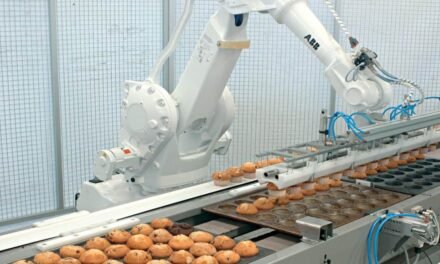Artificial intelligence (AI) and machine learning (ML) are revolutionizing food processing, improving safety and quality of food. Rajat K Baisya explains what you need to know the revolution about ML and AI in Food Industry and the risks that comes with it.
Table of Contents
Artificial Intelligence (AI) and Machine Learning (ML) will change how businesses will be managed in the future. Technology and the pandemic have changed the business and revenue models of many industry verticals, which is still grappling with. Artificial intelligence (AI) is making huge waves in the world of food and beverage. More and more organizations within the industry are recognizing the potential of AI to drive greater efficiency and profits, reduce wastage and provide protection against supply chain disruptions.
Revolutionizing the Food Industry with AI and ML
AI has numerous possibilities in terms of changing business performance, predicting the customers’ needs in the future, helping processors to develop new products aligned with future customer preferences, reducing the manufacturing time, and as such, further reducing the inventory holding as well as reducing the wastage and thereby reducing the cost of products and improving the profit margins and many more.
AI in Restaurants: Enhancing Efficiency and Guest Experience
Artificial intelligence for restaurants is gaining traction as a new way to improve the guests’ experience while saving precious time and lowering costs. AI technology can be employed to enhance ordering accuracy, engage guests online, improve marketing, and increase operational efficiency. McDonald’s has already tested the power of technology at certain locations. Some fast-food chains even use voice-activated AI for orders placed by phone. AI can also help reduce food wastage in restaurants, track shipments, and stock levels, and improve business forecasting.

Transforming Food Safety: AI’s Impact on Quality Assurance
However, the technology is expensive to implement, and there are privacy concerns about the security of data collected from guests and other drawbacks. AI enables faster and more efficient planning of delivery of food items by applying different AI algorithms and estimating the average time for reaching different routes. It helps companies deliver fresh foods faster to customers in a very efficient way. The possibility seems to be immense.
By using machine learning, artificial intelligence imitates human intelligence. The areas include predictive analysis, identifying potential hazards and opportunities, risk management, cost reduction, improved collaboration and communication, improved human resource management, etc., where AI can significantly impact the project outcome and business performance, provided it is used judiciously based on reliable, robust datasets.
AI and FMCG: Unleashing Insights for Future Product Success
As AI is a data analytical tool, data quality, robustness as well as versatility would determine the impact of its application on business performance. As such, AI has many limitations and challenges that go with it. It is also an expensive proposition for business.
AI assists Project Manager in improved resource allocation, taking a holistic perspective of the project and thereby preserving the scarce resources for the business and project sponsors. Therefore, AI needs to be integrated into the workflow of business and projects. As technology is evolving, constant adjustment and upgradation is a key imperative. Some businesses are leveraging cutting-edge technology to help businesses automate processes and increase efficiency. 2023 has seen a surge in the number of AI companies in India.
Let us examine a few areas of our value chain to see what are the potential impact of Artificial Intelligence (AI) and Machine Learning (ML) in the food processing industry.

Smart Manufacturing: Large Players Harnessing AI for Growth
Machine learning and artificial intelligence can be used to transform food safety and quality data management. AI can provide a feedback loop for existing food safety and quality programs to determine whether they are fulfilling the goals and expectations of business quality assurance management policy as well as legal and statutory requirements.
AI can help with products and ingredients, including input and output food material, for sorting and segregation based on their quality and standard, thereby eliminating product failure, delivering quality assurance, and meeting customer requirements. With the help of machine learning and AI, however, this process can be automated. It will not only speed up the sorting process but also eliminate any errors caused by humans.
Challenges and Benefits: Navigating the AI Landscape in Food Business
Artificial intelligence is useful in ensuring that food products meet specific criteria. Another tedious task that humans earlier handled is quality inspection. The food industry needs to maintain high standards of quality and maintaining the right standard as prescribed by the regulatory authorities. With mass production of food items and products, quality can seldom be hampered and ignored. This is better managed when the production process runs in compliance with AI-empowered machines.
The very first use of Artificial intelligence in food industry is that it helps FMCG businesses to analyze the prevalent customer demands and desires. On the basis of big data analytics and machine learning models, AI can extract useful insights about the needs and desires of the customers that lead to product development. With AI, the success rate of future product launches can be expected to improve.
Embracing the AI Evolution in Food Industry
As opposed to the traditional system of packaging products, where a team of two or more would place items in a box and seal the box, the current scenario has drastically evolved with the emergence of intelligence automation. Today, automated machines know the exact quantities they have to release in the packaging container, and it takes less than a quarter of a minute to pack a set of items. AI thus can reduce both manpower in the production line and ensure better accuracy.

The Future of SMEs in AI-Driven Environment
The MNCs and large domestic players have already made investments in identifying the opportunities to use technology to leverage for improving the performance of AI-assisted new product development programs as well as cost reduction through smart manufacturing, operations, and supply chain management. For example, HUL’s Head office in Mumbai has its agile innovation hub that pivots around three axes, namely, consumer, customer, and operations. The facilities are also accessible at all locations in Unilever across its global markets. It is a new reality, a new consumer ecosystem which is integrated with corporations’ business plans, processes, and category innovation programs.
Challenges and Concerns: Adapting to the AI Evolution
Larger companies will benefit from these new-generation technologies, which are basically analytical tools to process big data. ChatGPT is the new platform designed to exploit AI to initiate dramatic changes in business processes at all levels and functions, which will also require a new skilled workforce. But what will our small and medium-scale industries do in this environment? How will they keep their competitive edge in the marketplace? They also need a skilled workforce in addition to investment and development in technology.
As mentioned earlier, if input data are unreliable, AI can also become a challenge for the processors. Proven and valid data can significantly improve performance, but not otherwise. Other issues that AI can potentially impact the business negatively are possible job loss causing sociopolitical concern. Also, bad data led algorithms can lead to unintended consequences. Humans build algorithms, and bias can inadvertently get built into this. The algorithm needs to be reliable and responsible for avoiding unwanted situations.
Conclusion: Navigating the AI Landscape
With automation, nefarious acts such as phishing, delivery of viruses to software, and taking advantage of AI systems because of the way they see the world might be difficult for humans to uncover until there is a real quagmire to deal with. Similarly, there may be new AI-enabled forms of terrorism to deal with. Whenever there is a transition with the evolution of technology, challenges and concerns are always there to be resolved. And AI will also go through such an evolutionary process. Despite all these apprehensions, potential benefits seem to greatly impact industries, businesses, and trade.
Author is the chairman of Strategic Consulting Group and served as Professor and Head of the Department of Management Studies, IIT Delhi. Prof Baisya is also the president of Project & Technology Management Foundation.

















